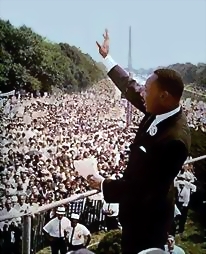Political Illusions and Biblical Realities:
Ten Reminders for Election Day
For Sunday November 12, 2006
Lectionary Readings (Revised Common Lectionary, Year B)
Ruth 3:1–5; 4:13–17 or 1 Kings 17:8–16
Psalm 127 or Psalm 146
Hebrews 9:24–28
Mark 12:38–44
 |
Condi Rice. |
This week many Americans will go to the polls to vote in mid-term elections. So will many Christians. Although the religious right conflates these two groups as if they were the same, they are profoundly different. Engaging the political powers and living as a Christian provokes intractably divided loyalties. For election day this Tuesday, I've prepared my own Christian voter's guide.
1. The lectionary Psalm for this week provides a stark warning: "Do not put your trust in princes, in mortal men, who cannot save. When their spirit departs, they return to the ground; on that very day their plans come to nothing" (Psalm 146:3–4). There's a tragic irony in the futility of politics that nevertheless solicits our absolute allegiance. The only place in the entire Bible where God laughs is at this inverse relationship between the pomposity of politics and its ultimate impotence: "The kings of the earth take their stand and the rulers gather together. . . The one enthroned in heaven laughs; the Lord scoffs at them" (Psalm 2:4).
2. The Old Testament is remarkably negative when it comes to political power, no matter who reigned. 1 Samuel 8 narrates the emergence of Israel’s centralized, royal power. The people wanted a king “like the other nations.” Samuel objected to their desire to mimic the pagan nations, went to God in prayer, and was rebuffed by the people. He ceded to their request but warned them of the harsh consequences to follow—the government would conscript their children for wars, make them domestic slaves, confiscate their land, and levy exorbitant taxes. Israel’s first king, Saul, did all this and more. His successors were worse. The political panorama of 1–2 Kings includes the reigns of forty kings and one queen (Athaliah in 2 Kings 11) in the 400 hundred years from the death of David to Israel's exile to Babylon in 586 BC. Only two kings received unqualified approval by the narrator (Hezekiah in 2 Kings 18:3 and Josiah in 22:2). With monotonous regularity, over thirty times he renders the ominous judgment that a king "did evil in the eyes of the Lord." Instead of the glorification or celebration of political power, his history of politics is uniformly pessimistic.
 |
Hillary Clinton. |
3. Whereas states must act out of brutal self-interest, Jesus calls his followers to act out of self-sacrifice. He invites us to love our neighbors as ourselves, to love our enemies instead of kill them, and to place others' interests ahead of our own (Mark 12:31, Matthew 5:44, Philippians 2:3–4). The warrior politician, observes Robert Kaplan in Warrior Politics, must adopt a pagan ethos. Like Machiavelli he does bad in order to accomplish good, promotes the necessary and not the nice, sanctions deceit to conduct war, refuses humanitarian intervention when no national interest is at stake, or slaughters many people in order to secure economic interests. The Christian, it would seem, has two choices: withdraw from this unsavory realm, or enter the fray at the risk of losing your soul.
4. When the Roman state arrested Jesus and he stood before Pontus Pilate, he insisted that "my kingdom is not of this world" (John 18:36). He never backed a political party or proposed a political plan, even though he invited every person to "seek first His kingdom" (Matthew 6:33) and to side with the poor, the vulnerable and the disenfranchised.
5. When Judas betrayed Jesus and one of his followers drew his sword to defend him, Jesus warned, "all who draw the sword will die by the sword" (Matthew 26:52). Contrary to claims that violence can be redemptive or meritorious, violence always begets more violence. This certainly questions the death-dealing militarism of so many governments, past and present, including our own.
 |
Martin Luther King, Jr. |
6. Blessed are the peace makers (Matthew 5:9), said Jesus. War, torture, domination, and exploitation (and the propaganda that makes them possible) are causes for repentance not celebration. The disparity between what our country spends on war-making to kill and degrade human life and what we spend to enrich and ennoble human life (health care, education, science, or the environment) constitutes a will to death. Pray for more peace-makers.
7. If Jesus experienced the intoxicating power of political glory as a satanic temptation (Matthew 4:8–9), then we should expect the same. Consider this inscription from Asia Minor in about 9 BC that describes Caesar Augustus: "The most divine Caesar...we should consider equal to the Beginning of all things...Whereas the Providence which has regulated our whole existence...has brought our life to the climax of perfection in giving to us the emperor Augustus...who being sent to us as a Savior, has put an end to war...The birthday of the god Augustus has been for the whole world the beginning of good news (the Greek word here is evangelion, commonly translated “gospel”)." Allegiance to such grotesque idolatry is precisely what political power demands, and what the follower of Jesus can never give. The early Christian confession that "Jesus is Lord" included an explicit political claim: Caesar is not Lord.
8. When Mary was pregnant, the birth announcement of Jesus included an ominous prophecy directed at the authorities and powers: "He has brought down rulers from their thrones, but has lifted up the humble" (Luke 1:52).
 |
Daniel Berrigan. |
9. The Roman state executed Jesus as a subversive threat, then attacked the church for 300 years. At first these persecutions were sporadic, localized, or at the whim of an emperor like Nero. But under Decius (249–251) persecution became a systematic and universal state policy. Diocletian (284–305) meted out the last, most severe and cruel terror. In his Ecclesiastical History, Eusebius (265–339) describes the Imperial edict issued by Diocletian in March 303: “It was enacted that the meetings of the Christians should be abolished, churches be razed to the ground, that the Scriptures be destroyed by fire, that those holding office be deposed and they of their household deprived of freedom, if they persisted in their profession of Christianity.” Only with the Edict of Toleration issued by Galerius in 311 did these persecutions of Christians end. Thus the early Christians understood Babylon in the book of Revelation to be Rome—the great whore, dragon, beast, and "the city of power."
10. We should never confuse the relative claim upon us to "render to Caesar what is Caesar's" with the absolute and unconditional claim to "render to God what is God's" (Matthew 22:21).
The (in)famous peace activist and Jesuit priest Daniel Berrigan (b. 1921) spent time in prison for his civil disobedience against government policies on racism (he marched in Selma), nuclear arms, and most famously Vietnam (he is also pro-life). Along the way he's written numerous books of poetry and prophetic protest. His Credo is a refreshing reminder for election day:
I can only tell you what I believe; I believe:
I cannot be saved by foreign policies.
I cannot be saved by the sexual revolution.
I cannot be saved by the gross national product.
I cannot be saved by nuclear deterrents.
I cannot be saved by aldermen, priests, artists,
plumbers, city planners, social engineers,
nor by the Vatican,
nor by the World Buddhist Association,
nor by Hitler, nor by Joan of Arc,
nor by angels and archangels,
nor by powers and dominions,
I can be saved only by Jesus Christ.
I like to update and expand Berrigan's repudiation of false hopes and misplaced trust. I cannot be saved by George Bush or Jesse Jackson, by Hillary Clinton or Condi Rice, nor by their successors or opponents. I cannot be saved by Green Peace or the ACLU, by Focus on the Family or by Promise Keepers. Which returns us to the Psalm for this week: "Blessed is he whose help is in the God of Jacob, whose hope is in the Lord his God" (146:5).
For further reflection
* What is your own greatest political temptation?
* Why do you think Scripture is so negative about the state and political power?
* Which Scriptures above speak to you most forcefully, and why?
* Consider Gregory Boyd who writes in The Myth of a Christian Nation: "the path through politics is not the road to God."
* See Jim Wallis, God's Politics; Gregory Boyd, The Myth of a Christian Nation; and Jacques Ellul, The Political Illusion.





